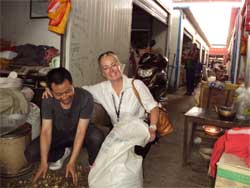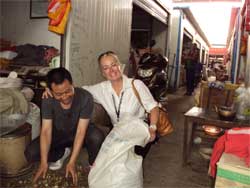 KINGSTON, November 1, 2012 – Two decades ago, Angela Gasparri was a single mom living on food stamps and a $324 monthly welfare check. The boxes she picked up at the grocery store came in handy: They doubled as living-room tables.
KINGSTON, November 1, 2012 – Two decades ago, Angela Gasparri was a single mom living on food stamps and a $324 monthly welfare check. The boxes she picked up at the grocery store came in handy: They doubled as living-room tables.
Through grit and hard work, this 54-year-old mother of four turned her life around and is now poised to graduate with a bachelor’s degree from a unique program at URI’s Providence campus that she credits with pointing her career in the right direction.
It’s called the Bachelor of Interdisciplinary Studies (BIS), and for someone like Gasparri, an older student working full-time, it’s a perfect fit. She’s around students her age, with similar life stories and goals. Nearly everyone, she says, works full-time as well.
What has made her journey even more astounding is that she has overcome challenges posed by her dyslexia.
“This program has really been great for me,” she says. “I can continue to work at a job I love. The program is mostly adults, and it’s close to home. The pieces of the puzzle just all came together.”
Originally called the Bachelor of General Studies, the BIS program was launched at the Feinstein Providence Campus in the mid-1970s. With today’s seismic changes in the economy and job market, adult and continuing education are taking on even greater importance at public universities.
The program is for adults who have been out of school for three or more years; most of the 120 students are in their late 30s and work. It’s good for people who have never gone to college or went to college but never earned a degree. It’s also designed for people who hold an associate’s degree and want to continue for a bachelor’s.
The program offers four majors – Communications, Business Institutions, Human Studies, and Health Services Administration – and gives students the freedom to collaborate with faculty to create a study area that fits students’ interests and backgrounds. Also, students can apply up to 88 credits of their previous college work toward the degree. Students can also earn credit through past job experience, military service, employee training, and tests.
“For a major, students take coursework in a number of different areas,” says Anne Hubbard, the program’s coordinator. “All problems in the world are complex, so this allows students to study issues from many perspectives.”
Gasparri is one of the program’s ideal students.
Raised in Pennsylvania and New Jersey, she spent her childhood living in different communities with her mother and father, an Episcopal priest. She eventually married but divorced in 1989 and found herself in financial trouble, relying on welfare checks and food stamps to support her children.
“We did as well as we could,” she says. “It was bare minimum.”
While living in Hannibal, Mo., she managed to get a certificate in respiratory therapy and, in 1991, moved her family to Rhode Island, where she had gone to church youth camps in the summer in Pascoag. She found jobs at Miriam and Rhode Island hospitals.
In 2006, she got an associate’s degree in Allied Health at the Community College of Rhode Island, but didn’t stop there. After co-workers told her she’d make a great manager, she checked out colleges in the area to earn a bachelor’s.
She chose URI and enrolled a few months after her CCRI graduation. To avoid taking out loans, she worked overtime and on weekends to pay tuition. She’s very familiar with the night shift.
“One semester I worked every weekend so I could take two days off during the week to go to classes,” she says. “Sometimes it can be very challenging. But my life is work and school now. You get it done.”
She never told her URI professors about her dyslexia because she didn’t want to be treated differently. It took her days to read texts and weeks to write papers, but she never gave up. In fact, she became an overachiever. Her grade-point average is 3.5.
Last summer, her life took an unexpected – and thrilling – turn when she went to China on a 10-day trip to observe the country’s health care system as part of an independent study project. It was her first time overseas, and she paid for the $6,000 journey by working long hours at the hospital.
She toured hospitals and clinics in Beijing, Xi’an, and Shanghai. She was stunned by the uneven quality of care. Patients in the city got better care than patients in rural areas. Some hospitals used acupuncture to anesthetize patients during heart surgery, while other hospitals – “almost palaces” – used laparoscopic techniques seen in American hospitals. She was also surprised by the frequency of herbs to treat ailments.
What’s her impression of health care in China?
“I think it’s mediocre,” she says. “It’s okay, but in some areas, especially the rural communities, it needs a lot of improvement.”
Gasparri, who lives in the Pawtuxet Village neighborhood of Cranston, is set to graduate in May, majoring in Health Services Administration. She might take a break over the summer and then return to school in the fall for a master’s degree or a bachelor’s in nursing. URI’s nursing school, one of the best in the region, is a possibility.
Down the road, she’d like to work in an urban area with people who are poor.
“I want to get into the community, to help people who need mentoring and nurturing,” she says. “I feel that’s my mission now. I know what the struggle is all about. I’ve been there. I can reach out to those in need.”
To learn more about the BIS degree and other programs at the downtown Feinstein Campus, you can attend an open house on Nov. 15, from 5 to 7 p.m., at the college, 80 Washington St., in Providence. For more information, call Hubbard at 401-277-5305 or visit uri.edu/prov/bis.
Pictured above
URI student Angela Gasparri hugs a vendor selling herbs in a Chinese market.
Photo by Angela Gasparri

